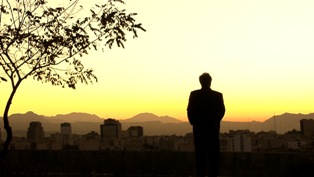2010.10.25[Interviews]
ŌĆ£The Solitude of Prime NumbersŌĆØ Interview with Saverio Costanzo(Director), Alba Rohrwacher(Actress) (10/25)

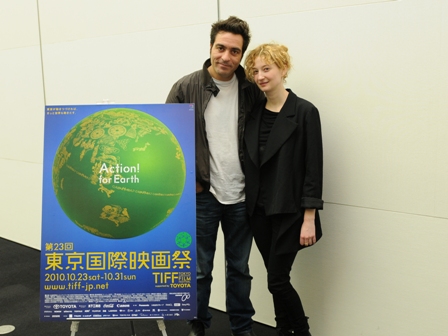
---The popular original story became the ultimate best seller of the year 2008 and has been translated to more than 30 different languages. The film makes the most of the original novel and still takes an advantage of the film characteristics to create the unique world. How was the response of the audience in Italy?
Director Saverio Costanzo :I think this occurs very often but, the readerŌĆÖs responses were divided. The readers who liked the original novel had mixed feelings of betrayed and the readers, who didnŌĆÖt think much about the original novel, experienced the film freely and felt the quality of the film.
---The reaction of the Japanese readers was to bring the curtain to the film with the happy end. The film you made seemed to understand the voice of the fansŌĆ”
Director Saverio Costanzo:I needed to bring an end to the story with two of them touching each other. It is not necessarily a happy ending. I think the last scene was that they lay their weapons down for the meantime.
---YouŌĆÖve co-written the screenplay with the writer of the original novel, Paolo Giordano, right? I thought youŌĆÖve nicely created the climax. Was it your idea to make revisions to the chronological sequence? Did you have a conflict of opinion with Giordano?
Director Saverio Costanzo:There is always a clash of opinion during the collaborative work. It basically proceeded smoothly. I made the film into a complicated structure so that I wouldnŌĆÖt shun the readers who experienced the story away. I had to display it in a different way. To conscientiously make it in to the film, there was a section in the story where I needed to change. Paolo Giordano has courageously given me a freedom in that respect too. But for Giordano, he must have had something to lose by doing so.
IŌĆÖve disconnected and revised the chronological sequence, but it brings out the memory of the film. We can lay the memory on childrenŌĆÖs image. It is the presence that we understand the memory of the childhood. We can understand something that we couldnŌĆÖt understand in the past in the presence.
---How did you co-write the screenplay?
Director Saverio Costanzo:We had a full one week of scriptwriting session and kept continuing that. It took one year to complete the screenplay. It was my idea to make a revision to the chronological sequence.
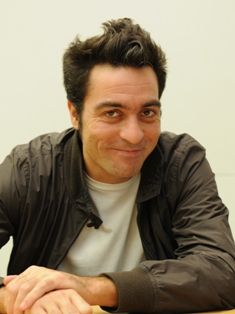
---Mattia and Alice were just like the characters that I have imagined them to be in the original novel. TheyŌĆÖre portrayal of having a hidden strength inside even after being emotionally scarred, were excellently shown in the film. How did you organize the casting from the childhood to the younger days?
Director Saverio Costanzo: I walked the city of Trino looking for the children that looked like Alba and Luca. The most difficult thing was to find somebody who looked by them.
---Amongst the audience, the actor who played Mattia and Luca Marinelli, the actor who played Mattia during his younger days looked like they were brothers and this became a popular topic of conversation.
Director Saverio Costanzo: They arenŌĆÖt really brothers. We are fortunate. The mother of a child who played the childhood of Mattia began to cry when she saw Luca. It was almost like looking at her own child grow up.
---As the two of them became older, the appearance of the body changing is emphasized. When they reunite 7 days later, Alice had lost a lot of weight and Mattia had gained weight. I thought that their contrast looked humorous and sad as well. The actors must have gone through the big effort of doing this. ŃĆĆ
Alba Rohrwacher: Yes, it was certainly difficult, at the same time I think I was able to do a very meaningful job. It was more effective than using your head or do a psychological task, by specifically using the body and really feeling the pain with body; I think I can genuinely become that person that I am portraying.
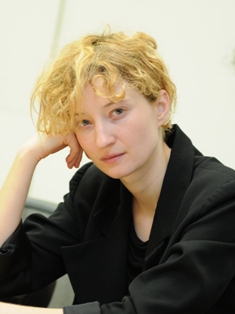
The Solitude of Prime Numbers
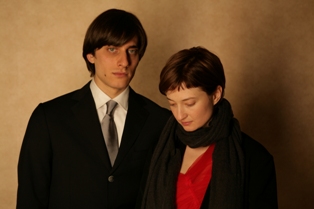
2010.10.25[Interviews]
ŌĆ£Let the Wind Carry MeŌĆØ Interview with Kwan Pun-leung (Director) and Chiang Hsiu-chiung (Director)(10/25)


---Mark Lee is a world-acclaimed cinematographer. What made you decide to make a documentary about him?
Chiang Hsiu-chiung ’╝łChiang’╝ē: I got to know Mark Lee just over 10 year ago, and I was inspired by his life experience and his approach to work. I always wanted to do Hou Hsiao-HsienŌĆÖs documentary, but I didnŌĆÖt have the opportunity. As for Mark Lee, I wanted to make a book about him. I became acquainted with Kwan-Pun-leung when I made a short documentary. I said to him that I wanted to make Lee Ping-binŌĆÖs book, he suggested a documentary rather than a book. It was left as that for a while, but with encouragement from Kwan, I decided to sound out with Mark Lee himself.
---Have you worked with Mark Lee, Mr. Kwan?
Kwan Pun-leung (Kwan): I participated in the filming of Wong Kar-waiŌĆÖs ŌĆ£In the Mood for LoveŌĆØ in the second unit. Mark Lee was in another unit as a cameraman, thatŌĆÖs how I got to know him. But I didnŌĆÖt work with him then, but when I was filming in Taiwan, I became interested in Mark Lee because I was told he is an excellent cameraman as well as being really helpful for young crews. I met him in Hong Kong by chance, and I felt he has tender affection towards people. I got to know him more in the process of making this film, and his affection goes for not just people but for animals and plants as well. His emotions, I think, appeal deeply to the audience.
---Mark Lee in the film looks like a wolf, but his eyes are very gentle and his sensitivity shines in between words. Did this appearance and inner side spark your imagination?
Chiang: Indeed, he is a very attractive person and his aesthetic is worth sharing, that is why I wanted to make a book about him. Though I am not a writer myself, I wanted to ask someone to write it, in order to let others to know about him. Even I wanted to watch a film about him rather than making one myself. But I decided to make it myself because I know both How Hsiao-hsien, and I have been with Mark Lee for a long time.
---You have been worked with many directors, Mr. Kwan?
Kwan: I have worked on two of Stanley KwanŌĆÖs films, and one of them was a documentary. I have been involved with Wong Kar-waiŌĆÖs films from the time of ŌĆ£Days of Being WildŌĆØ ’╝ł1990’╝ē. I did the retake of ŌĆ£Ashes of TimeŌĆØ’╝ł1994’╝ē, and I am currently involved in filming ŌĆ£2046ŌĆØ ’╝ł2004’╝ē and ŌĆ£My Blueberry NightsŌĆØ (2007).
---You are busy both in Hong Kong and Taiwan. Is there much interaction among the film makers?
Kwan: Lee Ping-bin worked in Hong Kong. As for recording, Tu Du-cheŌĆÖs team often worked in Hong Kong. I donŌĆÖt think there was much between Taiwan and Hong Kong.
Chiang: Kwan works a lot in Taiwan. ŌĆ£Zoom Hunting,ŌĆØ which will be shown at this festival this year, is also shot by him.
---You appeared in ŌĆ£Brighter Summer DayŌĆØ (1991), and then worked for Hou Hsiao-hsien and Edward Yang. Do you think you have been influenced by the two?
Chiang: Edward Yang led me into the world of films, and then I worked with Hou Hsiao-Hsien. I learned the approach towards work. They are really strict with themselves, which influenced me a great deal. In terms of the style, I donŌĆÖt think I was influenced by them because of the difference in the generation and tastes.
---How did you share the job in completing a film?
Kwan:ŃĆĆI am a cinematographer and I didnŌĆÖt have experience in directing a film. Chiang is not very experienced as a director either, so we just carried on without thinking about role-sharing. We flew to France when we heard that the shooting of ŌĆ£Flight of the Red BalloonŌĆØ was going to start in France, despite the fact that funding was not secured at the point. It was then suspended when Chiang gave birth to a child. When Mark Lee received an award in Norway, we went there with him. ItŌĆÖs all like that. Usually Chiang is the interviewer and I am a cameraman, but as she attended on her mother at that time, she operated the camera to film her mother.
Chiang: One of the reasons for the favourable review is his good taste in the images.
---Did two of you work out the overall structure of the film?
Kwan:ŃĆĆWe had images we shot over 3 years, so we edited them little by little and thought about how to put them together. I did the opening narration, and the womanŌĆÖs voice near the end is hers.
Chiang:ŃĆĆWe wrote the narration together, but the one that is read out at the end of the film is what Mark Lee said when he won the award in Norway.
Let the Wind Carry Me
Film Information
2010.10.25[Event Reports]
10/25 (Mon) International Competition Juries Press Conference: Notes & Quotes
Press Conference: October 25th (Monday), from 17:00 @Movie Café
Appearance: Neil Jordan, President of International Competition Jury (Film Director); Judy Ongg (Singer/Actress/ Wood Block Print Artist); Domenico Procacci (Film Producer); Hur Jin-ho (Film Director); Kichitaro Negishi (Film Director)
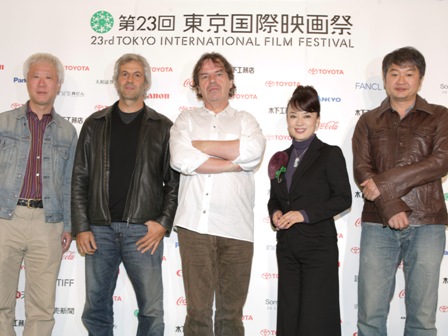
For the 23rd Tokyo International Film Festival, 15 films have been selected for the Competition section, from among which the Tokyo Sakura Grand Prix and other awards will be selected. The 5 members of the jury held a press conference this evening to comment on their enthusiasm towards the competing films and the festival.
Neil Jordan: I am very pleased to be here in Tokyo. I had a film at the Tokyo International Film Festival in 1985 called The Company of the Wolves. When I brought my film then, I watched it with the audience. But as a judge, our decisions will only be our own which is a whole new experience.

Judy Ongg: Since a child, I've been a great fan of movies because they were windows that introduced me to worlds I'd never seen. We've seen 5 films so far and I hope to make a good selection for the best film.

Domenico Procacci: I was quite surprised when I was invited to this jury but I appreciate it a lot. It is my first time to come here since when I shot the film Silk with Sonoko Sakai starring Koji Yakusho and Miki Nakatani.
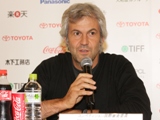
Hur Jin-ho: 9 years ago, one of my films, One Fine Spring Day was shown here at the Competition section for which I won an award. Now that I am back as a judge, I look forward to seeing the films for the rest of the week.

Kichitaro Negishi: We've been watching the Competition films intensely for the past two days. My honest opinion is that it is difficult for a film to be selected at a film festival but judging films is equally a hard task. I hope I'll encounter a
film that would make me forget that I am watching it to judge it.
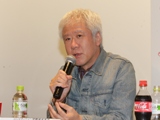
ŌĆĢŌĆĢ The members of the jury were asked about their criteria for judging.
Neil Jordan: There are no criteria. You judge a film the way you judge any a piece of work of the imagination. It either reaches out and grabs you or it doesn't. I find it amazing at film festivals that the most unlikely film can suddenly be
a revelation. The only criterion is my emotional response to what I am looking at.
Judy Ongg: I think about whether I could watch the film as an audience rather than be caught up in the criteria of judging. Just as Mr. Jordan said, it's all about whether a film grabs your heart.
Domenico Procacci: Judging a film is something very subjective. The 5 of us here can respond in 5 different ways to the same film. What's crucial is whether a film grabs me and how I emotionally and intellectually respond to that work.
Hur Jin-ho: While judging, if I'm asked, "If you were the director of this film, would you be able to make it better?" My answer will probably be "No." In that sense, if there is any measurement to judge a film, it would probably be
whether I am able to find a word that literally moves my heart.
Kichitaro Negishi: After watching a moving film, if I still have the same feeling 10 minutes later and feel that the
filmmakers hid themselves throughout the film, then it is a film that has grabbed my heart.
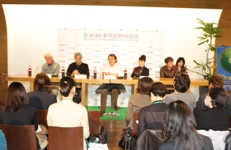
ŌĆĢŌĆĢ The judges all touched upon the reality of internet and mobile communication rapidly bringing changes to the film industry. As well, they commented on the environment and crucial issues, such as piracy, which the present day film industry entails.
Neil Jordan: It is a fact that there is a crisis in cinema going all over the world and it is extremely difficult times for individual voices to find an audience in Japan, Ireland, and the rest of Europe and North America. It is important that films do not find themselves in a ghetto of festivals. Festivals are enormously important because they are one of the only avenues left for serious filmmaking. Yet, it is also important that films leap beyond the festival circuit and find an audience throughout the world. They are the kind of films I hope to find in this festival.
Kichitaro Negishi: Japanese Filmmaking has a long history of almost 120 years. We perhaps have peaked to the point where great stories have already been told, which could be a reason why we are facing this crisis in the film industry.
It's true that mobile technology is so handy that we can even film things on our phones these days. Yet, to be able to see great works on a huge screen is an experience almost close to shock and is an emotional moment which is what film is all about.
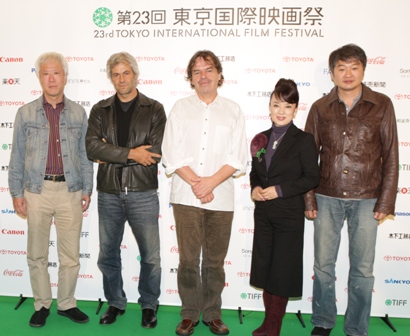
What makes a film festival of value is that minor films have the opportunity to move people and to be in the limelight. Also, it is where films gather from around the world, opening windows to other countries and cultures. The film that grabs the heart of the members of the jury and the audience will, without doubt, take the Tokyo Sakura Grand Prix this year!
2010.10.25[Interviews]
Winds of Asia ŌĆ£The Fourth PortraitŌĆØ Interview with Chung Mong-hong (Director) (10/25)

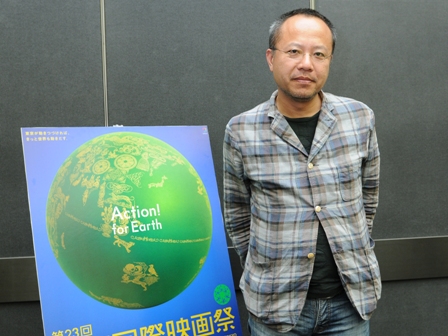
ŌĆĢŌĆĢThe Fourth Portrait is a first-run film now showing in the theatres in Taiwan starting from Oct. 22.
I'm afraid the movie probably won't be a big hit this time either. Audience in Taiwan doesn't like my work... To be honest, I wish to shoot the film that I want to make and have a commercial success as well, but things don't always seem to turn out that way.
ŌĆĢŌĆĢWell, considering many directors are being forced to take what they really don't want to, director Chung, you must be fortunate for shooting the film that he wants to make?
Not really (laugh), because unless you make a big hit, you won't be able to raise a fund for the next film. But it is also very gratifying when I could make the film just as I had imagined.
ŌĆĢŌĆĢAside from the success in the film market, you earned a well-deserved reputation receiving a number of awards and are being invited to the film festivals overseas.
It is such a great honor to receive the awards, and besides, it is very important to participate in the international film festivals in order to make the good world sales. But my duty is to devote all my energy to making a film, and there is not much left to do after that. So I am quite cool-headed about the things that come after the making of the film.
ŌĆĢŌĆĢTalking about the film festival abroad, you have visited the Pusan International Film Festival before coming to TIFF.
Audiences in Pusan and Tokyo are completely different. Audiences in Pusan are very ardent, and everyone seems to be urgent to comment something. On the other hand, audience in Tokyo is very quiet. But once you hear them talk, you find out that they appreciate the film in every detail. I'd rather prefer the audience in Tokyo.
ŌĆĢŌĆĢYour debut film Parking (2008) was quite shocking in many ways. In particular, I couldn't help wondering why big stars like Chang Chen and Gwei Lunmei appeared in this artistic film taken by a rookie director?
Let me just correct your comment first. There is no "big star" in Taiwan at the present. You might as well describe them as "famous" actors and actresses instead. I guess they were generous enough to appear in Parking because they wanted to back up the Taiwan films, or maybe had an expectation for a new type of Taiwan film to be created. Or perhaps they just had nothing else to do (laugh).

ŌĆĢŌĆĢAs you commented at the Q&A session after screening, Nagao Nakajima, cinematographer of this film is actually you yourself. Filming of Parking was exquisite in its stylish way that reminds us of your career as a TV commercial director. Now in The Fourth Portrait, the image of the film is beautiful as ever, but sharpness seems to have concealed itself.
When shooting Parking, I had tried not to fall into the habit of making commercial films, which ended up in vain. So with that in mind, in making The Fourth Portrait, I took the utmost care in simple film making, but I don't think I am thoroughly successful in that sense. My assignment is to get rid of the habit of making commercial films.
ŌĆĢŌĆĢTo get rid of it?
I think my experience in TV commercial making is an obstacle when making movies. The fact that most of the directors with TV commercial career are not making a big success in Taiwan might be the proof.
ŌĆĢŌĆĢOne more thing that is essential in talking about the The Fourth Portrait is your documentary film Doctor (2006). The second painting appearing in The Fourth Portrait was drawn by a boy named Felix who commits suicide in the Doctor, and you mentioned that the painting had inspired you to finish up The Fourth Portrait.
Doctor is a documentary, but I have a special feeling for it because it is my first feature film. It is very true that the picture drawn by Felix had a great influence in making the The Fourth Portrait, but I am thinking of saying goodbye to Felix after this film. IŌĆÖve made up my mind to get over his past and go on to a completely new direction for the next film.
ŌĆĢŌĆĢThat must be your new work which you start shooting next year, and in that new film, I heard that you have a plan of doing away with the element of black humor that was prominent in the previous works.
Yes, that's right. It is going to be a very scary horror film featuring schizophrenia. I do wish to take part in the Tokyo International Film Festival in 2012 with this new film.
The Fourth Portrait
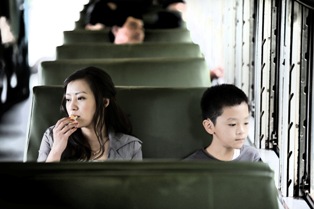
2010.10.25[Event Reports]
10/25 (Mon) Competition Section "Primary!"ŃĆĆPress Conference: Notes & Quotes

Appearance: Francisco Alfons├Łn (actor/producer/co-writer), Dan Uneken (producer)
Here are some notes and quotes:
Dan Uneken (DU): We are extremely excited to be in the Tokyo International Film Festival this year. We are a very small and humble production company so it's exciting to be among so many big companies and great movies!
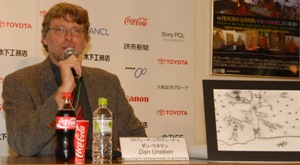
Francisco Alfons├Łn (FA): It's an honor and privilege that a small idea coming from an art teacher/director decides to make a film about a primary school, and that that film is now in an international film festival. This is absolutely a dream!

Q: Are the drawings here in this room the actual drawings used in the film?
FA: Yes, they are. As I said, it all started when Iv├Īn got a job as an art teacher at a school. After a year, he wanted to show the imagination and creativity of the children. Therefore, this film is almost like a documentaryŌĆöeverything in this film comes from Iv├Īn's experience. The drawings here are the actual drawings of the children who were in Iv├Īn's art class during that one year. The only thing we invented was to build a ŌĆśjourney' for the adults in the film in order to give a narrative to the story. In a sense, the adults are the frame and the children are the picture.

Q: Was most of the acting done without a script?
FA: That's right. We didn't have a script written. Iv├Īn would say "action!" and then we'd spend 30-45 minutes just having a normal class as the cameras went around the room. We used 3 small cameras, Canon Mark II, so the kids weren't aware of the cameras. There weren't any lines to learn, marks on the floor to watch for, or any frame shots designed previously. It was all coming from improvisation.
Q: Why did you choose to focus on 7, 8 year olds out of all the grades in primary school?
FA: Very simpleŌĆöthose were the kids that Iv├Īn taught for a year so he already knew the kids very well!
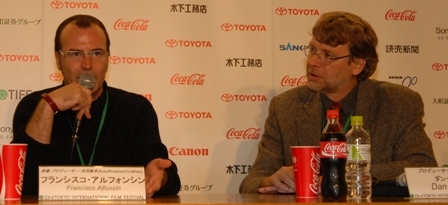
Q: How did you come up with the situations for each teacher in this film?
FA: Firstly, a lot was taken from Iv├Īn's experience such as the meeting every 3 months, the formal language, the conflicts between the teachers, and how teachers behave. Over the course of time, we then selected 3 different types of people: bitter, proactive, and a person not from the world of teachers.
Also, we tried to draw 3 different kinds of relationships between adults and children. The first was that Jose Maria's, son died, next was that one of the teachers was a mother of 4 children and got pregnant at the end of the film, and lastly was a mother with a teenage child going through adolescence.
Q: Did the children see you as an actor or as a teacher?
FA: The first time I met the kids was when we were shooting the film, which is the opening scene. This was when I had my first class with them. Since Iv├Īn was of course on site, the children projected his image onto me so they treated me more as an alter ego of Ivan rather than as an actor. Also, because of the relation and dynamics of the shooting,
there wasn't a proper acting structure. I was actually teaching and talking to them. So I think in the end the kids looked at me more like a teacher.
Q: You have previously made 2 movies with Ivan. What are these films about?
FA: Primary! is the end of a trilogy about childhood. The first film was about the period between adolescence and adulthood. Then, we made a second film about lack of communication between three generations; a 10-year old child, a father just released from prison, and the grandmother. These 2 movies being quite serious and deep, I think after a year of teaching kids, Iv├Īn wanted to do something lighter.
Since his debut in 2008, Noel's third film vividly portrays the charm and extraordinary creativity of schoolchildren, which he describes as the "Great Theater of Primary School!"
Primary!
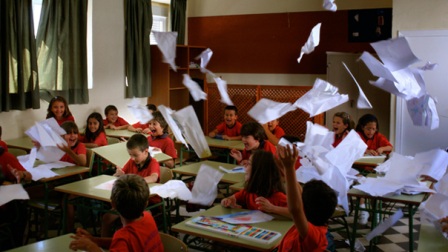
Film Information
2010.10.24[Event Reports]
Photo Report: 10/24 Guest Appearance
MONGA: Q&A @ TOHO CINEMAS ROPPONGI HILLS SCREEN2
Guests-(from right)’╝ÜNiu Chen-Zer(Director), Ching-Tien Juan(Actor), Mark Chao(Actor), Lee Lieh(Producer),
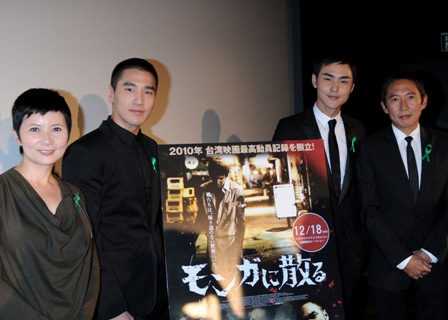
Winds of Asia-Middle East, Taiwanese Cinema Renaissance: New Breeze of the Rising Generation
Open Ceremony, Taiwanese Cinema Renaissance: New Breeze of the Rising Generation @ TOHO CINEMAS ROPPONGI HILLS SCREEN2
Guests: Khan Lee(Juliets, Producer), Ning Chang(Zoom Hunting, Actress), Lieh Lee (MONGA, Producer), Hsieh Hsiao-yun(Commissioner, Department of Cultural Affairs,Taipei City Government Executive Secretary, Taipei Film Commission), Mark Chao (MONGA, Actor), Frank J.K. Chen(Director of Department of Motion Pictures Affairs Government Information Office, Taiwan), Niu Chen-Zer (MONGAŃĆüActor), Vivian Hsu(Juliets, Actress), Ching-Tien Juan (MONGAŃĆüDirector)
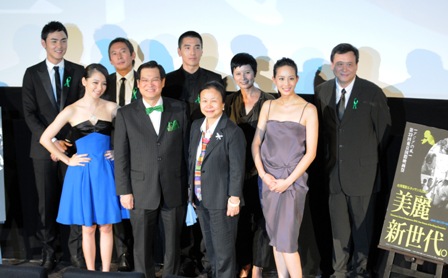
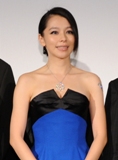
Special Screenings
Despicable Me: Stage Appearance @ TOHO CINEMAS ROPPONGI HILLS SCREEN7
Guest: Chris Meledandri(Producer)
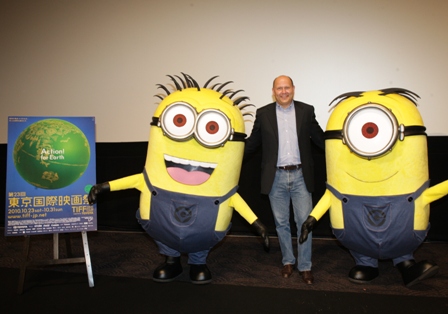
WORLD CINEMA
Hands Up: Q&A @ TOHOCINEMAS ROPPONGI HILLS SCREEN6
Guest: Roman Goupil(Director/Screenplay)
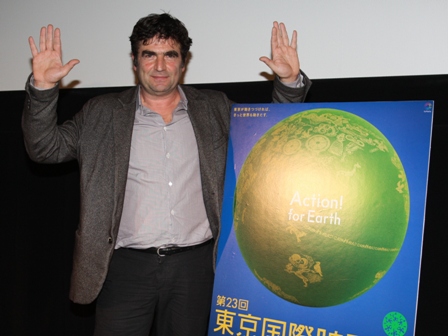
Winds of Asia-Middle East
Dog Sweat: Q&A @ TOHOCINEMAS ROPPONGI HILLS SCREEN6
GUESTS: Hossein Keshavarz(Director/Writer/Producer/Editor), Maryam Azadi’╝łWriter/Producer)
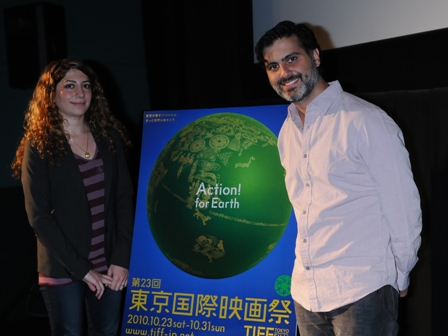
natural TIFF supported by TOYOTA
The Four Times: Q&A @ TOHO CINEMAS ROPPONGI HILLS SCREEN3
GUEST: Michelangelo Frammartino (Director/Screenplay)
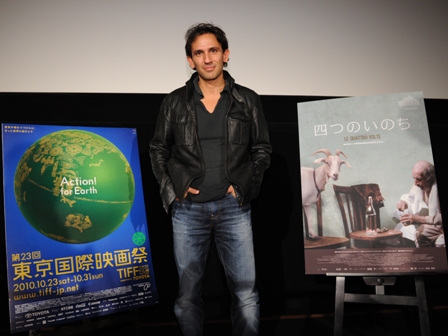
Special Screenings
Leonie: Stage Appearance @TOHO CINEMAS ROPPONGI HILLS SCREEN2
Guest: Hisako Matsui(Director)
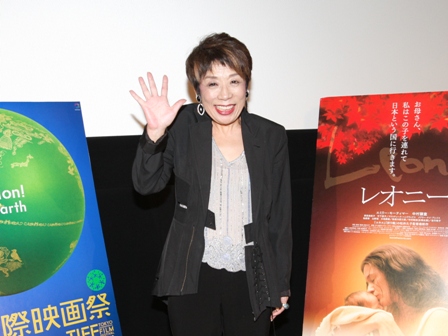
WORLD CINEMA
The Solitude of Prime Numbers: Q&A @ TOHO CINEMAS ROPPONGI HILLS SCREEN6
Guest: Saverio Costanzo(Director / Screenplay), Alba Rohrwacher(Actress)
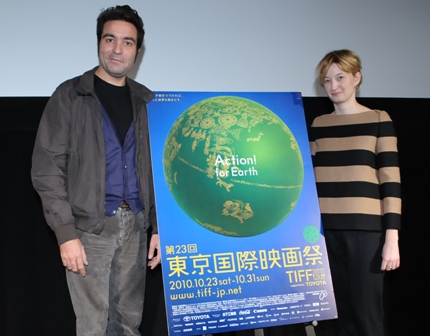
Competition
Zephyr: Q&A @ TOHO CINEMAS ROPPONGI HILLS SCREEN7
Guests: Belma Bas(Director / Screenplay), Seyma Uzynlar(Actress), Birol Akbaba(Producer)
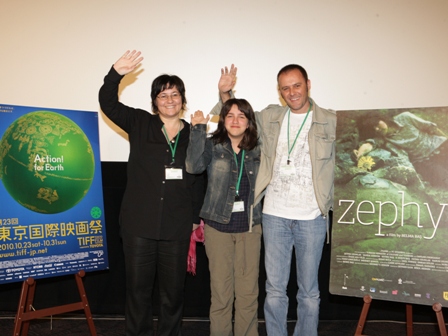
Winds of Asia-Middle East, Taiwanese Cinema Renaissance: New Breeze of the Rising Generation
Juliets: Q&A @ TOHO CINEMAS ROPPONGI HILLS SCREEN5
Guests: Hou Chi-jan(Director/Screenplay), Khan Lee(Producer), Vivian Hsu(Actress)
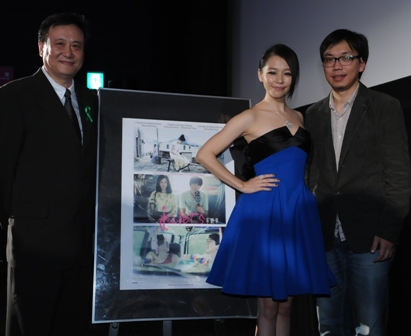
Japanese Eyes
hospitalité: Stage Appearance @ TOHO CINEMAS ROPPONGI HILLS SCREEN1
Guests: Koji Fukuda(Director/Screenplay/Editor/Producer), Kiki Sugino(Producer/Actress), Kenji Yamauchi(Actor), Kanji Furutachi(Actor), Bryerly Long(Actress), Eriko Ono(Actress), Kumi Hyodo(Actress)
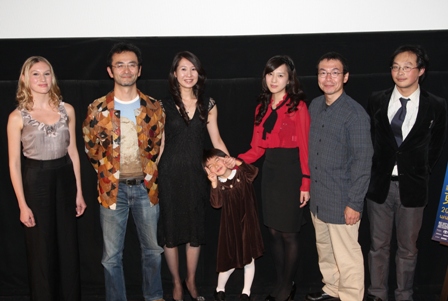
Special Screenings
POTICHE: Stage Appearance @ TOHO CINEMAS ROPPONGI HILLS SCREEN5
Guests: Catherine Deneuve(Actress), Miki Maya(Actress)
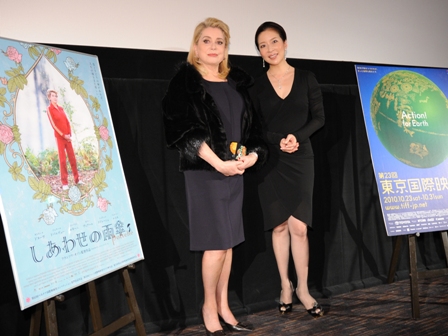
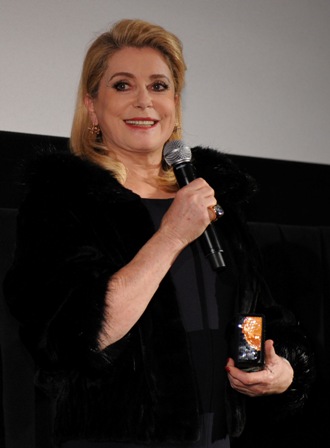
Competition
Buddha Mountain: Q&A @ TOHO CINEMAS ROPPONGI HILLS SCREEN7
Guests: Li Yu(Director/Script Writer), Fang Li(Producer/Script Writer), Sylvia Chang(Actress), Chen Bo Lin(Actor)
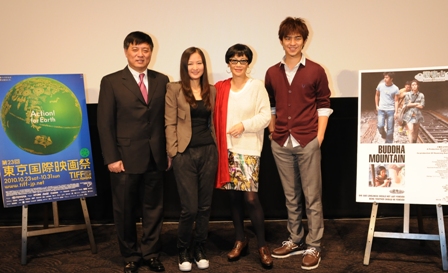
Winds of Asia-Middle East, Taiwanese Cinema Renaissance: New Breeze of the Rising Generation
Zoom Hunting: Q&A @ TOHO CINEMAS ROPPONGI HILLS SCREEN5
Guest: Ning Chang(Actress)
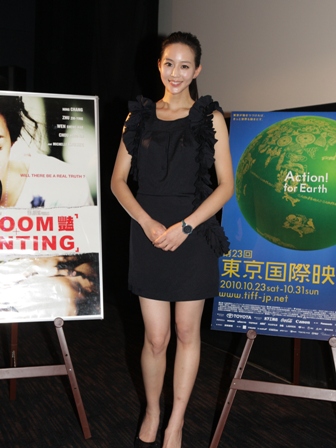
Winds of Asia-Middle East, The 70th Anniversary: Bruce LEE to the Future
The Legend is Alive: Q&A @ CINEMART ROPPONGI SCREEN4
Guest: Dustin Tri Nguyen(Actor)
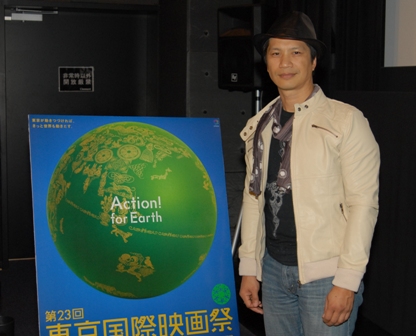
2010.10.24[Interviews]
Competition ŌĆ£ZephyrŌĆØ interview with Belma Bas (director) and Seyma Uzunlar (actress) (10/24)


---Generally, when the conflict between adult and child is portrayed in the film, it is mostly adult-exploits-child relationship. This film is extremely unique and powerful in the sense that the action which the child took driven by her own feelings ended up as a big threat from the adult point of view.
Belma Bas: In the films which depict children, there is often a stereotype of ŌĆśchildren as being pure.ŌĆÖ However, that is not what I think, so I wanted to break away from such clich├®. There are so much storm blowing within children that are already forgotten or have already become something beyond comprehension for grownups. And that is the inner power that children inherently have. Grownups fear this power and thus educate them and try to hold a position of absolute authority in order to suppress the childrenŌĆÖs power. The name ŌĆ£ZephyrŌĆØ means the gentle wind from the west, like the wind that butterflies make when flapping their wings. Even the smallest wind has a big potential. We are losing that innate power through adulthood. You could also take this film as a youth story.
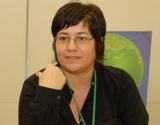
---I hear your film was inspired by your childhood memories of spending some time in the countryside with your grandparents.
Bas: Well, I had never wished to do what the child has done in the film to my own mother (laughs). There were so many similar incidents that kept happening in Turkey that I became interested in this issue. Such cases could be interpreted as actions to become individuals by detaching the connection with the family. In other words, by becoming a different being, you gain a separate self. I wasnŌĆÖt like Zephyr, I had a happy childhood. But on the other hand, I never could feel the emotional detachment with my family. It is indeed necessary to detach yourself in the process of growing up.
---The severity and beauty of the nature is focused throughout the film. In general, when a childŌĆÖs crime is depicted, it often accompanies external factors such as poverty or friends giving bad influences. This derives from the idea that children are inherently pure as you just mentioned. In this film, there seems to be no factor that would give ill effect on Zephyr, and since everything is depicted with the great nature, the childŌĆÖs very last action seems to be strangely convincing.
Bas: I use the phrase, ŌĆśmother natureŌĆÖ metaphorically. There is a threefold theme in this film. The first one is a ŌĆścrimeŌĆÖ, like the one you see in tabloid paper. The second theme is the youth story in which the lead character tears off the navel string that ties oneself with the family and becomes an individual. The third theme is keeping this great nature from being destroyed. This film was taken in the Caucasus region which is the most ecological area in the world. Various kinds of species inhabit the area providing richness in every aspect. Nevertheless, its richness has been destroyed with a terrifying speed by the human activities through construction and years of logging. I really wanted to make it stop by all means. I believe that the children are similar to the nature. The nature can be good or bad. And like the poison mushroom, even fragile and small, it could be very lethal and could take lives.
ŃĆĆŃĆĆ
---Ms. Seyma Uzunlar, were you able to follow ZephyrŌĆÖs behavior without any difficulty? Did you have any trouble in playing the part?
Bas: Let me explain first. I did not give her the whole scenario at the beginning, but gave her the scenario for each scene as it was needed. For the last scene, I did not tell her any particular meaning of her action. This is because I did not want her to get any bad effect from that scene.
Seyma Uzunlar: We often had to work until late at night, and it was tough to wake up early in the morning. The place was on top of the mountain and it was so cold at night.

---How long did it take for shooting the film?
Bas: 7 and half weeks. It rained a lot and the climate was quite bad, so the shooting wasnŌĆÖt easy. And also, all the actors and actresses were amateurs except for the actress playing my mother, and that also prolonged the shooting period.
---Did you go to school during that time, Seyma?
Uzunlar: I knew you asked that question (laughs).
Bas: As a matter of fact, we are relatives, and the place the film was taken at
my parentsŌĆÖ house, and Seyma lives next door. Besides, it was during her summer holidays.
---Could you tell us about your next work?
Bas: I am thinking of making the series. The title of the next film would be ŌĆśHeroineŌĆÖs journey beyond windsŌĆÖ if translated in English. ŌĆ£ZephyrŌĆØ comes from the name of the west wind in Greek myths, and my debut short film is titled ŌĆ£PoyrazŌĆØ which is also the godŌĆÖs name meaning the north wind. The next film is also related to the wind, and is about the solitary mother and a 17-year-old daughter.
Zephyr

2010.10.24[Interviews]
WORLD CINEMA ŌĆ£Hands UpŌĆØ Interview with Romain Goupil (Director) (10/24)


---Your works are known among film fans as almost mythical. I am glad to see the official screening in Japan for the first time.
To me, Japan as portrayed in Yasujiro OzuŌĆÖs films is more mystical. His screen structure is brilliant, his direction is rich and expansive, and I like the fact that ordinary people are portrayed. I am glad to be able to come to Tokyo for the first time.

---Your work is also about ordinary people, mostly acted by non-professionals.
In this film, I looked at children at the other end of the spectrum to adults. Ordinary adults are not always kind. Teachers, police, and all kinds of adults can be a threat to children. Something is not working out as they hoped in the adult world, so they try to get rid of Milana and her friends. Children see the flaws in adults.
---Even children are incorporated into the political situation. Is this in your everyday life?
What is important for children is to take good care of their friends, regardless of their nationality. If the approach to protect what is essential to you is considered political, then it is in my everyday life. How well you live together with the people you love is an issue we have to tackle ourselves, and it is not working out very well in real life. There is a scene in ŌĆ£Mourir ├Ā 30 ansŌĆØ where I, when I was 14 at the time, enter a basement for a scheme to transform the world. I set the camera at the same position without noticing it in ŌĆ£Hands Up.ŌĆØ I asked the children, two generations later, to do the same thing. I had to do the same thing because it did not work back then. I realized it only after someone pointed it out to me.
---These scenes point to important themes which is there consistently from ŌĆ£Mourir ├Ā 30 ansŌĆØ to the latest work. They are ŌĆ£to form a groupŌĆØ and ŌĆ£to go underground.ŌĆØ
In my film, a group is an entity to implement an attempt to live together. ThatŌĆÖs why they gather in an apartment or a basement to try out different things. They think how to live together, just like dreaming in a closed space. Many people may think politics is useless but I think it is wonderful from the viewpoint of thinking about others, and films can present such queries to the audience. I am not making political films as an activist, but I am making films that present questions. ActivistsŌĆÖ films will have some sort of assertions and they will suggest solutions, but that is not what I want. My biggest ambition is to prompt viewers to think after the film. IŌĆÖm not hoping everyone is thinking about the same thing at the same time. Rather, someone thinks of something at some point in time, then a little later, someone else links the idea to something else, and the idea develops. ThatŌĆÖs what I am interested in and what I hope for. ThatŌĆÖs why I always present an image, followed by another conflicting image. The same goes for the sound, with conflicting sounds used side by side, which creates some sort of uncertainty. This causes anxiety among the audience, but the uncertainty leads to questions and that is what I am aiming for. To me, films that address questions and uncertainties are political films.
---Two images are presented at the ending. One is the image of children raising their hands, as remembered by the girl, and the other is the image of children not raising their hands, as remembered by the boy. Are these contra-positive images to do with what youŌĆÖve just said?
The girl says she doesnŌĆÖt remember who said first to raise hands, which means it wasnŌĆÖt her who suggested. Then the boy says he remembers it was silent. You can see in the image that people around them were messing around or rejoicing, so the boyŌĆÖs claim that it was silent is also inaccurate. The claims by the two do not match, but what is important is the fact that they do not match. I want to draw attention to the fact that differences arise when you look back on an incident to retell the story. The image of children emerging with their hands up may have been overlapped by the image of a boy, with his hands in the air, coming out of the ghetto in Warsaw. Or the hands were up simply to protect themselves from being hit by their parents. One image does not correspond to one truth. A film in itself is a beautiful fabrication, so it was partly to pay homage to it. These are the reasons for the counter-positive images. There should be something emerging from amongst many counter-positive images. I believe in films in that sense, but not the images.
---In ŌĆ£Lettre pour LŌĆ”,ŌĆØ Mathieu Amalric is wearing a sweatshirt with ŌĆ£Juste une imageŌĆØ printed on the chest. It is from GodardŌĆÖs saying, ŌĆ£ce n'est pas une image juste, c'est juste une image (It is not a just image, but it is just an image). I guess the difference between the two is important to you.
It was GodardŌĆÖs collaborator, Jean-Pierre Gorin, who mentioned ŌĆ£a just imageŌĆØ. When Gorin, a forthcoming activist, suggested taking a just image, this was probably GodardŌĆÖs rather skeptic response, being a sarcastic and contradictory person. It has always been an issue in political films whether ŌĆ£just an imageŌĆØ is ŌĆ£a just imageŌĆØ, which he implied. After {Lettre pour LŌĆ”}, I began to think what is a ŌĆ£just imageŌĆØ. I believe Godard also thinks it is dangerous to assume the existence of a just image. There is another episode about Godard. When he was asked why he makes films, he responded that he makes films to avoid the question (eviter le pourquoi). I donŌĆÖt agree with this statement. I make films to pursue the answers to the question.
---The question of how to live together is an important issue in Japan where the voting rights for non-Japanese nationals is being discussed, and this film sheds light right on it.
When you read a book, you sometimes come across to a phrase which exactly sums up your feelings. I would be most pleased if even one person can feel that way with my film. A Jewish thinker said, ŌĆ£There is no meaning in history, there are only tragedies and disasters to turn away fromŌĆØ. However, if one person objects to something which is taken for granted, for example, the slavery system, and if one more person joins in, and one more, then history can be changed, and that is where the subtlety lies. If there is something which you feel is not right, you should express your objection so that the utopia you aim for will be achieved in the end. I think that is the only way.

---I think this film is an extension of your past work, but with wider frontage. I hope this screening will pave the way for more of your films to be screened in Japan.
As you said, one cycle which started with ŌĆ£Mourir ├Ā 30 ansŌĆØ has come to a close with this film, and something new is emerging. I am going to leave the analysis of the past for now, and I intend to make something a little lighter from now on.
Hands Up
Film Information
2010.10.24[Event Reports]
[VIDEO] WORLD CINEMA "The Solitude of Prime Numbers" Q&A 10/24 (Sun)

Guest: Saverio Costanzo’╝łDirector/Screenplay), Alba Rohrwacher(Actress)
The Solitude of Prime Numbers
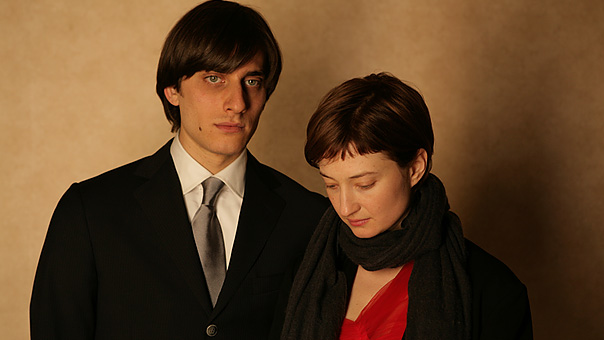 Film Information
Film Information
2010.10.24[Interviews]
Winds of Asia "Dog Sweat" Interview with Hossein Keshavarz (Director) & Maryam Azadi (Co-writer/Producer)(10/24)

New era has been infused into the world of Iranian films that had already established vivid lyrical images through the works of internationally famous directors such as Abbas Kiarostami and Majid Majidi. The infuser is the director Hossein Keshavarz, 32 years old genius. His first feature-length film ŌĆ£Dog Sweat,ŌĆØ in which he co-wrote the script, produced and edited, was presented at the Winds of Asia-Middle East section.
This is an ambitious work that realistically portrays the lives of 6 young men and women that suffer various emotional conflicts. In the interview, he talks about his expectation toward the film world of his homeland, his vision for the future as well as his thoughts for this memorial work.
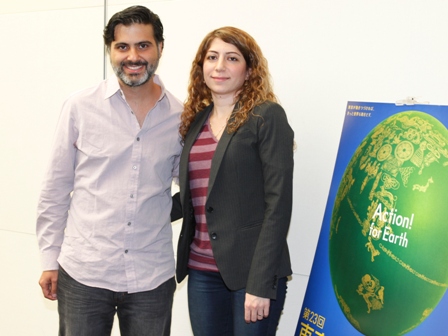
---Keshavarz knew that the Iranian films somehow have a fixed image, and one of the motivations for making this film was to get rid of this stereotype.
Iranian films have negative images which associate with deserts and religious connotation. But in fact there is a wide range of people living in Iran, and most of them live in the cities. Two thirds of the population is under 30 years old, so the country is full of energy. I wanted to show and describe this reality in the film.
---He has cooperated with Azadi, the co-writer and producer of Dog Sweat, in order to embody his idea.
Through fighting (laugh). There were numerous episodes that we wanted to write, and so it was hard to make a short list. I focused on talking about young people and wrote up the first draft in about 7 days. Then we had a long discussion about various points and developed the plots spending 6, 7months or more.
--- Dog Sweat deals with the reality in Iran, and includes criticism for Islam fundamentalism. There must be a considerable restriction in shooting underground.
Though I can't talk about how I filmed it, we shot when we could, and took a lot and edited many pieces. So, most of the budget was used for post-production. Before filming, I had black beard, but now it went gray. You can imagine how difficult the shooting was.
---They were rewarded for their efforts as the film succeeded to depict the six characters' frustrations with reality. Furthermore, it is impressive that the film doesn't combine all characters in the end, which is typical for ensemble drama.
Dog Sweat literally means a best homemade alcohol. All people in the story go after what they want, even if it doesnŌĆÖt officially exist. So each episode is based on a common desire, but we didn't want to say that everything was related.
---Keshavarz and Azadi, sharing the same goal, overcame numerous hurdles and got married last year.
There is an old Iranian saying, "if you want to know someone, you should travel together," but I think "you should make a film together."
--Your feature debut film was Asian-premiered here in Tokyo.
I am really honored. I have been interested in Japanese culture, especially Yasujiro Ozu's "Tokyo Story" is my favorite. It's great opportunity to visit and learn more about Japan. I feel there are some similarities between Iran and Japan, in terms of traditional way of thinking, like family bonds and respect for elders.
--While living in the U.S., he pays great respect for Iranian senior filmmakers including Kiarostami and Majidi, and aspires to produce films in his homeland Iran.
Of course, they are fantastic filmmakers, but today, a lot of young directors, including myself, make films about the characters that they can empathize and understand. I would like to encourage this trend. Iran has such a great energy, and I have so many things I want to depict there.
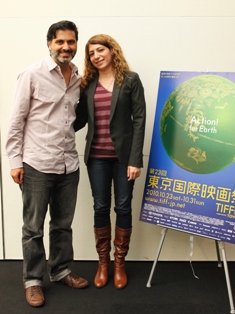
The day may come when Keshavarz will be the producer of a film directed by Azadi. Supporting each other for the same purpose. Hopefully with the participation for the TIFF, they will make the next leap forward.
Dog SweatŃĆĆARAGH SAGEE
